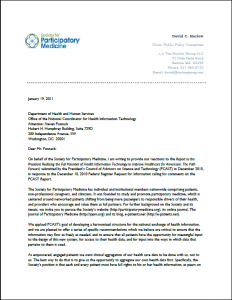 Click the image to view the letter we submitted last week to ONC, commenting on the December 10 report of the President’s Council of Advisors on Science and Technology (PCAST) about health IT. The response was driven by SPM policy chair David Harlow and approved by the executive committee. Some key excerpts:
Click the image to view the letter we submitted last week to ONC, commenting on the December 10 report of the President’s Council of Advisors on Science and Technology (PCAST) about health IT. The response was driven by SPM policy chair David Harlow and approved by the executive committee. Some key excerpts:
“In the long run, each patient should have the right, and the easily exercised ability, to
- Access all of their own health data. (The right to receive data)
- Share information in the record with other individuals or organizations, privately or publicly, as the patient sees fit. (The right to send freely)
- Aggregate data in a meaningful way from multiple sources (e.g., multiple physicians, clinical labs, imaging centers), before anyone else does, or at least as soon as anyone else does. (The right to aggregate)
- Flag errors and add comments, and have comments acknowledged even if not “accepted”, in an automated and trackable fashion. (The right to correct data)”
“For purposes of this discussion, our key comment, and our goal for the national HIT infrastructure, is that every patient must be a full peer on the health information network.”
“Empowered, engaged patients want the aggregation of their health data to be done with them, not to them.”
“We suggest that health information exchange should learn to navigate health information with and through patients, rather than presume to navigate around them.”
For a great summary of the issues in the PCAST report, and other stakeholders’ positions on them, see Vince Kuraitis’s e-Care Management blog, or the cross-post on The Health Care Blog.






Didn’t even know SPM was making statements like this or even had a public policy committee. Thanks so much for posting!
Marcela,
Yes, David’s earlier submission is in this post, earlier this month. We’re thrilled to have him in this role! As he said then: “I encourage all of you who are not yet Society members to join, and I encourage new and old members to consider volunteering to help with the wide range of public policy issues facing us today.”
This article and the various responses are very important to the healthcare in the USA today. I perceive some complacency at all levels when instituting new changes for the management of the standard medical records of our patients. While some definite percentage of individuals want to mange their medical records, I sense a lack of urgency for these PHR’s to be given to our individual patients for their benefit.
There are innumerable companies available for EHR at the hospital level. The same is true for EMR at the clinicians level, however, their is a paucity of companies for PHR’s. One of our future goals in my opinion is to educate and communicate the importance of these PHR’s. With high quality and accuracy, we should be able to save lives, minimize medical errors, and reduce medical expenses accordingly.
The Federal Government felt monetary incentives were necessary to implement the change over for EHR and EMR, however even with these financial incentives there is no rush to switch. One has to ask the question “why”? Is the cost to switch too expensive? Are the financial incentives too little? Can we not entrust an individual to have their PHR’s available to them. In some circumstances the answers may be yes!!
This gives all of us food for thought. The other various articles also mention that electronic digitalized EMR’s may not reduce problems and or complications. Fortunately we are able to analyze these articles carefully and realize their deficiencies.